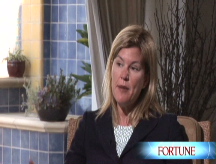Why taxpayers should own banks
Officials float the idea of buying shares in troubled institutions - just the kind of help the credit markets need.

NEW YORK (Fortune) -- After coordinated interest-rate cuts by central bankers and approval of a $700 billion rescue plan did little to unlock credit markets, Treasury officials are now discussing whether it's time for the government to take a direct ownership stake in the banking system.
It's about time. By putting the weight of the government behind select institutions, officials can make it clear to the market that some big banks won't be allowed to fail - a measure that could help to restore confidence to lenders that have taken in recent weeks to hoarding cash instead of making loans.
The key is to vanquish the fear that has left short-term money markets frozen - potentially strangling growth by withholding the credit consumers and businesses need. One approach is to recapitalizing troubled banks via purchases of preferred stock, as officials now appear to be discussing.
Indeed the United Kingdom took a similar step earlier this week, when the Treasury arranged to provide as much as 50 billion pounds ($88 billion) to eight big banks in need of capital. Paulson seemed to indicate in a statement Wednesday that TARP - the Troubled Asset Recovery Plan passed last week by Congress - gave the Treasury sufficient leeway to take similar action here.
"Nationalization works because it creates confidence," said John Hempton, an investor and financial analyst based in Australia. Investors around the globe lost faith in American finance when it became clear that Wall Street had spent the boom years earlier this decade peddling bad debt, Hempton says.
But for the banks, restoring trust isn't merely a matter of saving face. Financial institutions borrow to finance their operations. Because Americans have been loath to save money in recent years, banks in the United States tend to have much smaller deposit bases than those in, say, Japan, where a high savings rate has given banks a surplus of deposits.
In America, by contrast, deposit-light financial firms have funded themselves in the short-term debt markets. That was a profitable strategy for years, because the wholesale funding markets generally offered low rates and abundant liquidity.
But since Wall Street's perfidy came to light in August of 2007, short-term lending rates have risen, squeezing firms that depended on market funding. The squeeze continued even as the Fed and other central banks created all sorts of new methods to lend to financial institutions.
And the vise has tightened in earnest in the past month, with the failure of Lehman Brothers and Washington Mutual and the forced sale or nationalization of five other firms.
The collapse of short-term funding markets recently forced two blue-chip U.S. companies, Goldman Sachs (GS, Fortune 500) and General Electric (GE, Fortune 500), to sell some $8 billion in preferred stock to billionaire investor Warren Buffett's Berkshire Hathaway (BRKB) to boost their capital. Those sales will cost the companies dearly: the terms call for Berkshire to get a rich 10% dividend in each case.
One question about the TARP, as it was originally conceived, is whether the government's planned purchases of illiquid mortgage-related assets would really help banks boost their capital cushions, which have been depleted by mortgage-related losses.
Paulson and Federal Reserve chief Ben Bernanke have indicated a preference for paying prices above the fire sale values quoted in the markets - which could, by forestalling further writedowns, help the banks' capital positions.
But overpaying for assets may leave taxpayers exposed to big losses and may simply drag out the time it will take for the real estate market to finish making the painful correction that comes when a bubble is popped.
Even TARP backers such as Buffett have suggested the plan is workable only if the purchases are made at market prices.
So why not have the government recapitalize firms directly by buying what are known as senior preferred shares? It's a more straightforward, honest approach to recapitalizing. And says David Merkel, chief economist at broker-dealer FinaCorp Securities, it puts taxpayers first in line to reap the benefits of any recovery down the road.
Yes, a government stake will dilute the ownership stakes of existing common and preferred shareholders.
But then, when credit isn't available, everyone pays, as policymakers are well aware.
"A continued correction in credit supply, fiscal receipts, investment, employment and consumer balance sheets is inevitable," wrote Lena Komileva, an economist at Tullett Prebon in London, a broker that facilitates business between other brokers. "The question is about the slope and duration of the downturn, not about the direction of the economic cycle."
Even direct ownership of banks by the government may not completely do the trick. Hempton says that however the next stage of the bailout unfolds, it's imperative that the government also stand behind the senior debts of financial companies in a bid to restore the confidence of the lenders that supply the bulk of financing for U.S. banks. The U.K. government made just such a move Wednesday, saying it will provide guarantees that will allow big banks to roll over maturing debt - on the condition that they raise capital as well.
Hempton cites last month's takeover of mortgage giants Fannie Mae (FNM, Fortune 500) and Freddie Mac (FRE, Fortune 500) as proof that a government backstop can work, even in a market as large as the one for mortgage-backed securities. By signaling that the Treasury would stand behind the debt the agencies have issued, the Fannie-Freddie takeover brought the foreign central banks that have been the big buyers of Fannie and Freddie securities back into the market, reducing U.S. mortgage rates.
By contrast, the failures of Lehman Brothers and Washington Mutual left senior creditors with substantial losses - potentially discouraging investors from investing their money into other financial firms that need funding as well.
Putting government money in now and backstopping the banks' debt will send a clear message that the U.S. is serious about restoring banks' capital and creditors' confidence before economic conditions worsen.
"As the rapid deterioration of market conditions following Lehman's collapse revealed," Komileva wrote, "a government move today is worth two tomorrow." ![]()
-
 The retail giant tops the Fortune 500 for the second year in a row. Who else made the list? More
The retail giant tops the Fortune 500 for the second year in a row. Who else made the list? More -
 This group of companies is all about social networking to connect with their customers. More
This group of companies is all about social networking to connect with their customers. More -
 The fight over the cholesterol medication is keeping a generic version from hitting the market. More
The fight over the cholesterol medication is keeping a generic version from hitting the market. More -
 Bin Laden may be dead, but the terrorist group he led doesn't need his money. More
Bin Laden may be dead, but the terrorist group he led doesn't need his money. More -
 U.S. real estate might be a mess, but in other parts of the world, home prices are jumping. More
U.S. real estate might be a mess, but in other parts of the world, home prices are jumping. More -
 Libya's output is a fraction of global production, but it's crucial to the nation's economy. More
Libya's output is a fraction of global production, but it's crucial to the nation's economy. More -
 Once rates start to rise, things could get ugly fast for our neighbors to the north. More
Once rates start to rise, things could get ugly fast for our neighbors to the north. More









